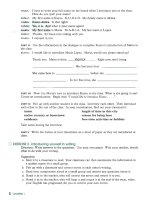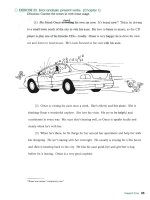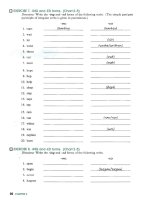Fundamentals of english grammar third edition part 23 pps
Bạn đang xem bản rút gọn của tài liệu. Xem và tải ngay bản đầy đủ của tài liệu tại đây (304.54 KB, 7 trang )
EXERCISE
28.
Length
of
time. (Chart 5-13)
Direcrdons:
Create sentences using
it
+
take
to express length of time.
1. I drove to Madrid.
(Length of time: three days)
+
It took me three
dayr
w
driw to
Madrid.
2. I walk to class.
(Length of time: twenty minutes)
3.
Gino finished the test.
(Length of time: an hour and a halfl
4. We will
drive
to the airport.
(Length of time:fony-five minutes)
5.
Alan hitchhiked to Alaska.
(Length ojtime: two weeks)
6.
I wash my clothes at the laundromat.
(Length of time:
two
hours)
EXERCISE 29. Length
of
tlme. (Chart 5-13)
Directions:
Use
it
+
take.
1. How long does it take you to
. . .
a. eat breakfast?
+
It takes me ten minutes
w
eat breakfast.
b. get to class?
c. write a short paragraph in English?
d. read a 400-page novel?
2. Generally speaking, how long does it take to
.
.
.
a. fly &om
(name of a city)
to
(name of a
cicy)?
b. get from here to your hometown?
c. get used to living in a foreign country?
d. commute from
(name oja local place)
to
(name of a localphce)
during rush hour?
EXERCISE 30. Length
of
tlme. (Chart 5-13)
Directions:
Create questions using
how
long.
1. A:
H~W
loyi
Aid
it take
ym
to Aviw to
NPW
Yovb?
B:
Five days.
(It
took me five days to drive to NewYork.)
A week.
(Mr.
McNally will be in the hospital for a week.)
3.
A:
B:
A long time. (It takes a long time to learn a second language.)
4.
A:
B:
Six
months. (I've been living here for six months.)
5.
A:
.
.
.
.,,.
,.
,
B:
Six
years.
(I lived in Istanbul for six years.)
I;
:
:.
,.,.,
6.
A.
B:
A couple of years. (I've known Nho Pham for a couple of years.)
7.
A:
B:
Since 1999. (He's been living in Canada since 1999.)
8.
A:
For 21 to 30 days, according to psychologists. (A person has to do something
consistently for 21 to 30 days before it becomes a habit.)
%'
3
EXERCISE
31. Length
of
time. (Chart 5-13)
Directions:
Work
in
groups of three. Only Speaker A's book is open.
Speaker
A:
Complete the sentence with your own words.
Speaker
B:
Ask a question about Speaker A's sentence, using
how
long.
Speaker C: Answer the question. Give both a short answer and a long answer.
Example:
It takes me
.
.
.
to
. . .
.
SPEAKER
A:
It takes me twenty minutes to walk to class from my aparunent.
SPEAKER
B:
HOW
long does it take (ha) to walk to class from her apartment?
SPEAKER
C:
Twenty minutes. It takes her twenty minutes to walk to class from her apament.
1.
It took me
.
. .
to get to school today.
2.
It usually
. .
.
me
. .
.
to get dressed in the morning.
3.
It.
. .
to
fly
from
. .
.
to
. . . .
4.
It
.
.
.
45
minutes to
an
hour to
.
.
. .
Switch
roles.
Switch
roles.
5.
It
. . .
to
change
the sheets on a bed.
9.
It
.
. .
to walk from
. . .
to
. .
.
.
6.
It usually takes me
. .
.
to eat
. .
.
.
10.
It takes
.
.
.
drive
. . . .
7.
It took me
.
.
.
this morning.
1 1.
It used to take
. . .
to
. .
. .
8.
It takes only a few minutes to
. . . .
12.
In class, it takes us approximately.
. .
to
.
. .
.
QUESTION
I
ANSWER
(a) How do you spa11 "coming"?
COM-I-N-G.
@)
How do you
say
"yes"
in
Japanese?
Hai.
(c) How do you saylpronounce this
word?
(d) How are you petting alonp?
(&eat.
(e) How
are
you doing?
(f) How's
it
going?
(g)
How do you feel?
How are you feeling?
Fine.
[okay. So-so.
Temfic!
Wonderful!
Great!
Fine.
Okay.
So-so.
A bit under the weather.
Not so good.
Temble!/Lousy./Awfd!
@)
How do you do?
How do
you
do?
To answer (a): Spell the word.
To answer
@):
Say the word.
To answer
(c):
Pronounce the
word.
In
(d), (e), and (f): How is your
lie? Is your
life
okay? Do
you
have any problems?
Note: (f)
is
also used in greetings:
Hi,
Bob.
How's
it
going?
The questions
in
(g)
ask about
health or about general emotional
state.
How do you do? is used by both
speakers
when
they
are
introduced
to each other in a somewhat
formal situation.*
*A:
Dr.
&k.son,
Zti
like
to
innoduceqau
w
afn'md
ofm*1+
Rick
Bmwn.
Rick,
JIir
ir
my
biology
pmfasm,
Dr.
8Wn.
B:
How
do
you
do,
M*.
Bmum?
C:
How
do
you
do,
Dr.
Enikon?
I'm
plead
to
mar:
you.
Asklng
Questions
143
EXERCISE
32.
More questions with HOW. (Chart 5-14)
Direcdas:
Close
your
books. Divide into two teams. Ask a student on the other team how to
spell the word
your
teacher says. (Alternatively, work in pairs, switching roles
after
item 9.)
Example:
country
SPEAKER
A:
HOW do you spell "country"?
SPEAKER
B:
C-0-N-T-R-Y
SPEAKER
A:
NO, that isn't right. The correct spelling is C-0-U-N-T-R-Y.
OR
Yes, that's right.
1. together
2.
purple
3. daughter
7. diierent 13. beginning
8. foreign 14. intelligent
9. studying 15. writing
4. planned 10. bought
5. rained
11. people
6. neighbor 12. beautiful
16. occasionally
17. family
18. Mississippi
EXERCISE
33.
More questions with HOW. (Chart 5-14)
.
Directions:
Ask your classmates how to say these words in their native languages.
1. Yes.
2. No.
3.
Thank
you.
4.
I
love you.
(8;
'
:
'
,
:,:
!.
':
,
:,
,
,
<
i
EXERCISE
34.
More q"est1ons with HOW. (Chart 5-14)
Direcrions:
Ask your classmates how to pronounce these words. Work in groups or as
a
class.
A,
,
,,.
,.
Example:
SPEAKER
A:
HOW do you pronounce the number 9?
SPEAKER
B:
(Speakm
B
pronounces the
wd.)
SPEAKER
A:
Good.
OR
No,
I
don't thiik that's right.
'
,
VSTB.
(1) (2) (3) (4) (5)
it.
.
I)"
(6)
(7)
(8) (9) (10)
zoos Sue's shoes chews choose chose those toes doze dose
~.
.I:._
',
,.,
144
CHAPTER
5
EXERCISE 35. Review
of
HOW.
(Charts
5-10
+
5-14)
Diremom
Complete the questions.
1.
A:
How
&kc\
do you get a haircut?
B: About every six weeks, I thinklguess.
2.
A:
does it take to get a haircut at Bertha's Beauty
Boutique?
B: Half an hour.
3.
A:
is it from the earth to the moon?
B: Approximately 239,000 miles or 385,000 kilometers.
4.
A:
times a day do you brush your teeth?
B: At least three.
5.
A:
does a snake shed its skin?
B: From once a year to more than six times a year, depending on the kind of snake.
6.
A:
is it from your desk to the door?
B: I'd say about four regular steps or two giant steps.
7.
A:
times does the numeral 9 appear in the numerals from
1 to loo?
B: 20 times.
8.
A:
does a bird's heart beat?
B: It depends on size. A big bird's heart beats more than
300 times a minute. A small bird like a hummingbird
has a normal heart beat of more than 600 beats a minute.
9.
A:
volcanoes erupt every year?
B: About 50. But that's just on Earth.
10.
A:
's it going?
B: Okay, I guess. What about you? What's new with you?
A:
Nothim' much.
11.
A:
Could you carry this box of books for me?
B: I'd like to, but I have a bad back.
is it?
A:
Pretty
heavy. That's okay. I'll ask Jack to carry it.
12.
A:
You blow on your hands to warm them. You blow on your soup to cool it.
Imagine that! Hot and cold from the same mouth. do
you explain that?
B:
I
don't know.
do you explain it?
Asking QuesHons
14
EXERCISE
36.
Review
of
HOW.
(Charts
5-10
+
5-14)
Directions:
Create questions for the given answers. Use
how
in each question.
Example:
It's
very important.
-*
How
important
is
good
health?
1.
Very expensive.
2.
1
took a taxi.
3.
Four hours.
4.
He's nineteen.
5.
In five minutes.
6.
With a knife.
7.
Every day.
8.
Three blocks.
9.
Fie.
10.
With two "t"s.
11.
It gets below zero.
12.
Excellent.
EXERCISE
37.
Review of questions. (Charts 5-1
+
5-14)
Directionc
Complete the dialogue with questions. Use any appropriate question words.
Work in pairs or as a class.
A:
ma+-
ave
yak
qoiw
to
do
this weekend?
1
B:
I'm going to go to a baseball game.
.
.
A:
There are two games this weekend.
7
2
B:
The one on Sunday.
146
CHAPTER
5
A:
yesterday?
3
B:
No, I didn't.
I
didn't know there was a game yesterday.
?
4
A:
Yes, I did, and I really enjoyed it.
B
:
to the game alone?
5
A:
No.
B
:
with you?
6
A:
Linda Rivera. to Sunday's game with?
7
B: A guy I work with named Bob Woo. He's a real fan.
A:
to the stadium from your apartment?
8
B: No,
I
can't. It's too far.
A:
9
B: Six miles.
A:
get there?
10
*
',>
B: By bus.
A:
get there?
,
.I*L.
11
B: Just twenty minutes.
,
,
A'
8
$
A:
start Sunday?
12
B: One o'clock.
A:
I wish I could join you.
to a baseball game?
13
B: About once a month. How about you?
,,*
A:
I go to a baseball game as often as I can.
B
:
to baseball games?
14
A:
Because it's a wonderful game, and it's so much
~%II
to be there and watch it in person.
B:
when you go to a game?
15
,
,
A:
I
yell, enjoy the sunshine, eat peanuts, and drink soda.
I
'I
B: That's exactly what I do, too!
Asking
Questions
147
EXERCISE
38.
Review of
questions.
(Charts 5-1
5-14)
Directions:
Create questions for the given answers.
Example:
I'm reading.
SPEAKER
A:
What
are
you doing?
SPEAKER
B:
I'm reading.
1.
It means "big."
2.
Three days ago.
3.
Once a week.
4.
Okay.
5.
By bus.
6.
Mine.
7.
Nonfiction.
8.
B-E-A-U-T-I-F-U-L.
9.
The park.
10.
Because
I
. .
.
.
1 1.
100
(miles/kilorneters).
12.
I'm going to study.
13.
A bit under the weather.
14.
How do you do?
15.
lbo hours.
16.
Six o'clock.
17.
Mary.
18.
Blue.
19.
Cold and wet.
20.
The one on the red chair.
21.
Chris's.
22.
With two "r"s.
23.
Andy and Ed.
24.
Five blocks.
25. 1989.
26.
Biochemisay.
27.
Making questions.
28.
Saudi Arabia.
In
the Middle East.
Oil.
Riyadh.
0
EXERCISE
39.
Rdew of questions. (Charts 5-1
+
5-14)
Directias:
Work in pairs. Create dialogues from the given words.
Example:
. .
.
usually get up?
SPEAKER
A:
What time do you usually get up?
SPEAKBR
B: 630.
1.
.
.
.
hit
. .
.
like best?
'I
L
,
2.
. . .
is south of.
.
.
?
3.
.
.
.
times a week do you
. . .
?
4.
.
. .
do tomorrow?
5.
. . .
is it from
. . .
to
.
. .
?
6.
.
.
.
in this
city?
Switch
rules.
7.
.
.
.
is sitting
.
. .
?
8.
.
.
.
should
I
.
.
.
?
9.
.
.
.
do for a living?
10.
. .
.
spell "happened"?
11.
.
.
.
take to get to
. .
.
from the airport?
12.
. .
.
getting along
in
your English classes?
148
CHAPTER
5









